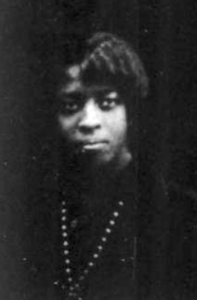
Floria Pinkney, 1926
*Floria Pinkney's birth on this date in 1903 is celebrated. She was a Black garment worker union activist and leader.
Floria Pinkney was born in Connecticut. Her parents were originally from Florida and migrated to Connecticut at the turn of the century. Pinkney's mother was a self-employed dressmaker. Shortly after Pinkney's birth, her then-widowed mother moved the family to Brooklyn. Before working in the garment industry, Pinkney attended Manhattan Trade School for Girls. She learned sewing machine mechanics and techniques and basic academic skills like writing there.
In 1925, Pinkney received a scholarship to Brookwood Labor College, sponsored by Garland Fund, which supported radical political causes. She also received a scholarship from the NAACP. The scholarship from Garland allowed Pinkney to learn more about organizing and apply it to helping Black workers succeed in the garment industry against segregation. Her scholarship at Brookwood was extended two years, and she was recognized as a class speaker. Pinkney becomes the first Black woman to graduate from Brookwood Labor College. Pinkney also studied at the Bryn Mawr Summer School for Women Workers, where she was one of the first five Black students to be admitted, and the International People's College in Denmark.
In 1930, Pinkney won an award from the New York School of Social Work to do a six-month Fellowship at the University of Copenhagen. This fellowship focused on work in Denmark in adult education and social organization. Pinkney joined the International Ladies' Garment Workers' Union (ILGWU) in the 1920s and was a promising leader. She was the first Black woman to hold a leadership role as an organizer within the International Ladies Garment Workers Union (ILGWU). She was involved in the garment industry throughout her life. She worked for several years before attending Brockwood Labor College.
After graduating, she returned to the industry in leadership positions. Among other roles, Pinkney served as Special Organizer for ILGWU in 1929. Pinkney was instrumental in the ILGWU's September 1929 drive to enroll Black garment workers. She spoke alongside A. Philip Randolph led the Brotherhood of Sleeping Car Porters and ILGWU Vice President Julius Hochman at St. Luke's in Harlem. Randolph endorsed Pinkney as an organizer for the ILGWU, calling her "a capable young woman." She worked beyond the garment district and was active in the Harlem and Brooklyn communities. Pinkney was a board manager for the Ashland Place YWCA in Brooklyn.
She led the YWCA branch's Industrial Assembly and represented the Ashland Place Y at a regional conference in Trenton in 1926. She attended the 1930 YWCA Industrial Assemblies Convention in Detroit, where she was selected to represent the Industrial Assembly in Geneva, Switzerland. Pinkney continued her advocacy work through the Women's Trade Union League (WTUL), specifically working with the Laundry Workers Union. In 1933, Congress passed NIRA, which led to a large increase in union membership because it protected employee rights and gave unions more power and visibility.
In 1935, she was appointed to teach worker education classes at the Harlem YWCA and Utopia Neighborhood House. Though known for her radical ideals, she also embraced labor interracialism; she took full advantage of her leadership roles. She used her organizing abilities to build up the Black community and union members and gain power and respect from white women leaders. In 1984, Pinkney attended a reunion of the Bryn Mawr Summer School for Women Workers. She died later that summer.